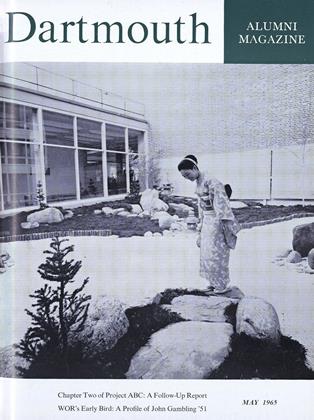"Why study a modern foreign language?"
Sometimes you ask a man such an elementary question in search of more than a elementary answer. Sometimes you are rewarded with an answer that illuminates.
One visitor came away from a recent talk with Eugene H. Falk, Edward Tuck Professor of the French Language and Literature, feeling thus illuminated.
"Why study a language? There's a whole spectrum of reasons. Some are good, some bad. About the worst reason is to prepare yourself to converse with customs officials or waiters on your trip abroad. If this is what you want, get a phrase book."
And the best reason?
"Language is man's most important tool, but one's native tongue seldom helps him appreciate this fact. A man usually reads his own language for content, seldom for the way the thoughts are expressed. Sartre said a literary work is a work of art, not because of what it says, but the way it says it.
"As languages are taught at Dartmouth, the student learns the different means by which thoughts are expressed. He comes to grips with how language is constructed and how words change or modify thoughts. And in classes here he is coming up against the finest literary models - the masters of the language - virtually from the beginning. There is no la plume de ma tante type of teaching at Dartmouth.
"He learns that clear" thinking is possible only through clear language, and a man's native tongue can often deceive him into thinking he's expressing himself clearly."
This concern with the manner in which thoughts are expressed is a good clue to the man who was appointed last year to the endowed Tuck professorship and to the chairmanship of the Romance Languages Department.
Professor Falk was born a Slovak, studied law in Prague (where he spoke Czech), studied literature at the Sorbonne (where he spoke French) and at the University of Manchester (where he earned his Ph.D.). Along the line he also learned German and Hungarian and developed a reading acquaintance with other languages.
He came to Hanover in 1963 from the University of Minnesota where he had been chairman of the Romance Languages and Comparative Literature Departments.
When visited recently he was preparing to leave for Paris where he is spending the spring term to dig further into how men express ideas. He had just completed a book on Types of ThematicStructure in the Modern French Novel. This is a study of how patterns of ideas are expressed by three modern Frenchmen — Andre Gide, Jean-Paul Sartre, and Albert Camus.
Professor Falk hopes to expand this study beyond the French novelists to take in a Japanese (Kobo Abe), a German (Thomas Mann), and probably several others.
The idea of internationalizing the studies grew out of seminar discussions at the Comparative Studies Center with Edward A. McCormick, Professor of German; Robert H. Russell, Associate Professor of Romance Languages, and others.
Its preference for the teacher-scholar was one of the things that attracted him to Dartmouth. To make the move from Minneapolis he gave up a Fulbright Fellowship, a sabbatical leave, and 11 years of associations at Minnesota. But he says he hasn't regretted it because he has found the kind of situation he sought.
Well, almost. One of his headaches at Minnesota as chairman of a large department was the burden of administrative detail. He wanted more time for study and writing. But sometimes you can't escape and he was appointed to his present chairmanship shortly after arriving.
"I found a gift from my new colleagues when I first moved into this office - a bottle of aspirin tablets," he said.
Judging from the bottle, which he still displays, he may have found the "leisure of the right kind" that he sought when he came to Hanover.
The bottle is still half full.
Prof. Eugene H. Falk
 View Full Issue
View Full Issue
More From This Issue
-
 Feature
FeatureCHAPTER TWO OF PROJECT ABC
May 1965 By CHARLES F. DEY '52, -
 Feature
FeatureWOR's Early Bird
May 1965 By HOWARD L. WEINBERG '62 -
 Feature
FeatureALUMNI COLLEGE '65
May 1965 -
 Feature
FeatureJAPANESE GARDEN
May 1965 -
 Article
ArticleWITH THE BIG GREEN TEAMS
May 1965 By ERNIE ROBERTS -
 Class Notes
Class Notes1940
May 1965 By ROBERT W. MACMILLEN, ROBERT H. LAKE
G. O'C.
Article
-
 Article
ArticleBASKETBALL RESTRICTIONS
OCTOBER, 1907 -
 Article
ArticleALTERATIONS AT HAPPY HILL CABIN
November 1921 -
 Article
ArticleClark Pond Leased
April 1940 -
 Article
ArticleMilestones
MAY 1963 -
 Article
ArticleAstronomer Gary Wegner: Seeker of another world
DECEMBER • 1985 By Dave Coburn -
 Article
ArticleMedical School Contributors
December 1960 By MEMORIAL GIFTS FROM:




